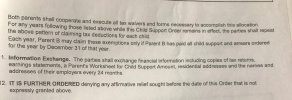- Jurisdiction
- Arizona
Hello everyone, here I am once more. Now some of you already know my history. But I have an update when it comes to my situation after one year of being divorced. So we end up having both parents (A and B) ( I am the B parent) 50/50 custody. She did the petition I just went by what she asked for and ran with it. Now on the documents from the court states that I as the B parent need to claim one of my child's for 2024 taxes. Also I am paying child support for the amount of $560 for the fact that she is paying for health insurance for both kids. Now at the start of 2024 I asked my Exwife to provide the social security number from one of my child which she did, so I added my child as a dependent. Now is Tax season and she saying that she claimed both of the kids. The reason she says because I never Took care of the kids from January till summer brake (june).but after june I did. It is not true, but she says she has proof. Now I have no clue what is she is talking about "proof". I do recognize that between January and may I wasn't able to completely take care of the kids let's say it was more like her 60/me40% in some weeks ONLY during every other months while I was getting my schedule together to work around it and provide parenting for my kids. At the same time when I was able to keep them longer to make up I DID. So now she is saying that I didn't. But she says that after June I did take care of them 50%. So my personal opinion over the whole year I did take care of them 85-95% over all. Please look at the picture as is a portion of the court order. I just need some advice in how to proceed with this because I been claiming my daughter since January 2024 but here I'm a bit stuck how to move forward because of course I haven't done my taxes. Income wise we both make the same $55-$65k. Of course I might have to go to court to do some paper work but just need some advice. Thanks !


